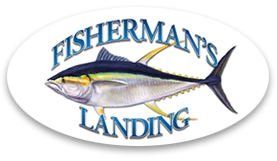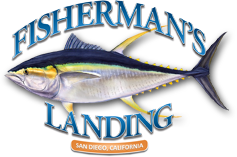Fish Report for 1-20-2005
Royal Star Fish Report
1-20-2005
Royal Star
There is one final subject regarding this latest voyage that needs to be considered by both us on Royal Star as well as the fishing community in general. Once again we enjoyed a bountiful share of good fortune making a highly successful voyage to Hurricane Bank. In such cases, regardless of our success, there is always an opportunity to learn and evolve. In fact, that is exactly why our industry continues to improve our catches of big fish; the best of us are always on the lookout for a better way to accomplish our fishing goals.
In the case of this voyage, it was amazing to me to see some of the finest rod and reel anglers in this venue making the same rigging mistakes costing them numerous victories in battles with trophy yellowfin. The number one motivation for this perpetuation of mistakes was the fact that a certain form of rigging, much preferred and successfully employed on prior long range voyages, was not believed to be cause of failure though the evidence was crystal clear.
Adapt, adapt, adapt. This is the golden rule of fishing that when broken will cause much heartbreak and consternation. The example last trip only demonstrates that those of us who do this most are still susceptible to judgment errors following history instead of present patterns. All of us long range operators have been guilty of such error on many occasions both in grand and minute form. A perfect example would be refusing to believe a condition change has occurred after several days on the anchor catching fish in a particular spot. Believing an area will come around, a skipper will not move the boat despite the obvious and many, many times pays a dear price for such refusal to acknowledge the fact. The point of course is to be observant, pay attention to conditions and patterns, and especially the success of those around you. You may be the one who all are watching on one particular day or trip, but rest assured that it will not always be that way.
Captain Toussaint made an excellent point while traveling home the other day when he stated that the best fishermen are always questioning their equipment and seeking improvement in their rigging methods. After all rigging is the most important component in the equation whether it is done to attract a bite or land a trophy fish. If your rigging is inadequate or prone to failure, your efforts are in vain; you will not land the fish. It is important to realize that your rigging must be adjusted according to the fishing and conditions. For example, one uses one hundred pound monofilament at night, when the fish are in an eager mood to bite, or when the weather is rugged to prevent break off?s as the vessel works in the seas. When the fish are touchy, the weather is cooperative, the fish are keyed on smaller bait, or any other number of the myriad of conditions requiring a gear adjustment occur one must adjust to make the most of whatever fishing opportunities are available at the time.
Again this is the golden rule that is too often overlooked by even those of us experts in our field. Fortunately between the anglers, Captain, and crew, there are many individuals on long range vessels to identify inconsistencies and advise or recommend accordingly. Your job as anglers seeking to improve your skill level is to be quick to listen, absorb, and apply whatever advice is dispensed to your advantage. Finally, it must be stated again that even the very best of us make such mistakes regardless of how many times we have to learn the lesson. No one will ever be perfect but by being aware, asking questions, and constantly seeking improvement, we can minimize the inevitable occasions when we miss the obvious.
Every trip is a learning opportunity. As Herb Gale appropriately stated ?Every day we are out here we discover how much we don?t know?. This succinct quote perfectly demonstrates why we all need to keep an open mind and be vigilant for the signs around us. It is wisdom a fisherman can live by.
In the case of this voyage, it was amazing to me to see some of the finest rod and reel anglers in this venue making the same rigging mistakes costing them numerous victories in battles with trophy yellowfin. The number one motivation for this perpetuation of mistakes was the fact that a certain form of rigging, much preferred and successfully employed on prior long range voyages, was not believed to be cause of failure though the evidence was crystal clear.
Adapt, adapt, adapt. This is the golden rule of fishing that when broken will cause much heartbreak and consternation. The example last trip only demonstrates that those of us who do this most are still susceptible to judgment errors following history instead of present patterns. All of us long range operators have been guilty of such error on many occasions both in grand and minute form. A perfect example would be refusing to believe a condition change has occurred after several days on the anchor catching fish in a particular spot. Believing an area will come around, a skipper will not move the boat despite the obvious and many, many times pays a dear price for such refusal to acknowledge the fact. The point of course is to be observant, pay attention to conditions and patterns, and especially the success of those around you. You may be the one who all are watching on one particular day or trip, but rest assured that it will not always be that way.
Captain Toussaint made an excellent point while traveling home the other day when he stated that the best fishermen are always questioning their equipment and seeking improvement in their rigging methods. After all rigging is the most important component in the equation whether it is done to attract a bite or land a trophy fish. If your rigging is inadequate or prone to failure, your efforts are in vain; you will not land the fish. It is important to realize that your rigging must be adjusted according to the fishing and conditions. For example, one uses one hundred pound monofilament at night, when the fish are in an eager mood to bite, or when the weather is rugged to prevent break off?s as the vessel works in the seas. When the fish are touchy, the weather is cooperative, the fish are keyed on smaller bait, or any other number of the myriad of conditions requiring a gear adjustment occur one must adjust to make the most of whatever fishing opportunities are available at the time.
Again this is the golden rule that is too often overlooked by even those of us experts in our field. Fortunately between the anglers, Captain, and crew, there are many individuals on long range vessels to identify inconsistencies and advise or recommend accordingly. Your job as anglers seeking to improve your skill level is to be quick to listen, absorb, and apply whatever advice is dispensed to your advantage. Finally, it must be stated again that even the very best of us make such mistakes regardless of how many times we have to learn the lesson. No one will ever be perfect but by being aware, asking questions, and constantly seeking improvement, we can minimize the inevitable occasions when we miss the obvious.
Every trip is a learning opportunity. As Herb Gale appropriately stated ?Every day we are out here we discover how much we don?t know?. This succinct quote perfectly demonstrates why we all need to keep an open mind and be vigilant for the signs around us. It is wisdom a fisherman can live by.






